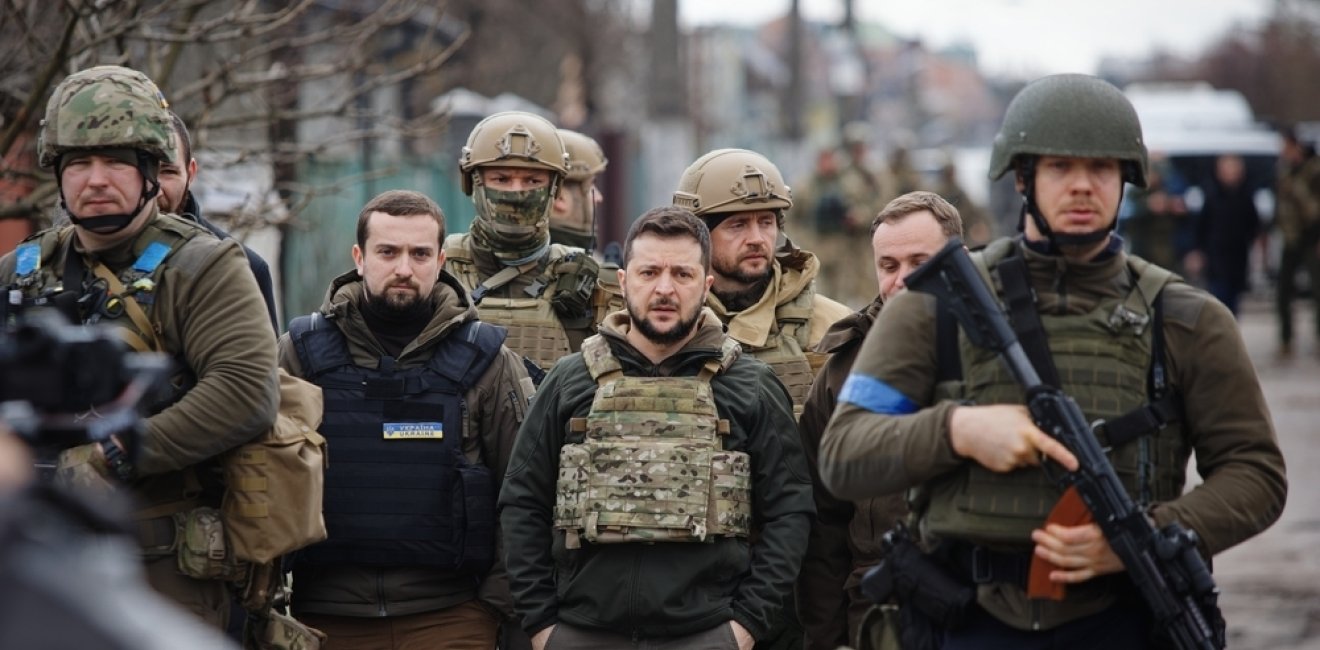
A blog of the Kennan Institute
President Zelensky has successfully consolidated Ukrainian society in the fight against Russia. The end of the counteroffensive is likely to bring a fresh focus on societal discontent and renewed calls for a more effective government.
Russia’s full-scale invasion of Ukraine led to the political consolidation of Ukrainian society, which united against the external threat. The central consolidating figure is President Volodymyr Zelensky, who has received widespread popular support, while criticism of the president by political opponents and journalists has practically ceased. Recently, however, a significant number of critical claims against Zelensky and his administration have been voiced by political elites and representatives of civil society. These claims may soon result in the unraveling of the political consensus around the president.
Two Historic Political Consolidations
During his short political career, President Zelensky has managed to achieve the impossible—he has politically consolidated Ukrainian society twice.
Zelensky first consolidated Ukrainian society in the run-up to the presidential elections of 2019. Despite lacking any political experience, he managed to unite behind his candidacy opponents to then president Petro Poroshenko (who remains politically active) and a significant part of the electorate that did not have a favorite in the presidential race. In the second round of the presidential elections, Zelensky won by 73.22 percent to Poroshenko’s 24.45 percent of votes cast. Zelensky won in twenty-three of Ukraine's twenty-four oblasts, an unprecedented result for a presidential election in Ukraine.
He continued his success in the 2019 early parliamentary elections, in which his Servant of the People party won a crushing victory and received a sizable parliamentary majority (254 out of 450 deputies). Thus in 2019, Zelensky consolidated a significant part of Ukrainian society and the political elites around his platform.
Later, however, the domestic political competition, a number of unsuccessful appointments, and public scandals that sprang up around the president and his team led to Zelensky losing popular support. By the end of 2021, the political consensus around the president was crumbling. The president and his team had failed to notch any significant reforms or achievements and had disappointed voters, especially on socioeconomic matters.
Zelensky’s behavior during Russia's full-scale invasion of Ukraine produced the second and arguably larger consolidation of Ukrainians around the president. If the first consolidation was associated with expectations of a better life and a more honest and responsive government, the second consolidation stemmed from the military threat and the need for resistance.
Both consolidations constitute something of a “Zelensky phenomenon,” which can be described as follows: in the face of tough political confrontation, Volodymyr Zelensky performs well and can generate huge support from voters and the political elites, but under normal political conditions he tends to pursue a poor personnel policy and ignores many problems affecting Ukraine’s population.
How a Political Consensus Falls Apart
The Russian invasion in 2022 made possible the current political consensus in Ukraine and the transformation of Volodymyr Zelensky into a central consolidating figure. The threat to national sovereignty and security motivated Ukrainians to unite around the president and put aside the usual quarrels and discontent. But in 2023, the situation may change.
Today's political discourse in Ukraine is focused on the Russian threat factor and high expectations of a future counteroffensive. The planned counteroffensive has become a political factor, and the results of this operation could potentially launch the beginning of the end of the existing political consensus in Ukrainian society around Zelensky. Behind the conversations about the counteroffensive there is a growing dissatisfaction with the state of affairs in the country, which may change society’s mood dramatically.
The dissatisfaction is mainly connected with how the government deals with nonmilitary issues—with its questionable personnel policy, ongoing issues with corruption, and the difficult economic situation. The end of the counteroffensive, whatever it may be, is likely to create an opening for socioeconomic issues to return to center stage and radically change the political agenda. This in turn would be expected to bring renewed criticism of President Zelensky’s and his team’s policies.
It can be anticipated that political competition and the politicization of the socioeconomic situation will sharpen and that voters’ support for the president will falter. After the end of the military campaign, political actors will no longer face internal restrictions on criticizing Zelensky. Altogether, these different factors are likely to lead to a decline of the political consensus around the current government.
Still, the weakening of Zelensky’s team’s positions will not strengthen the parliamentary opposition. The political situation could instead resemble that at the beginning of 2019, when the Ukrainian citizenry was looking for new political faces and forces, different from the pre- and post-Maidan leadership. A broad public demand is likely to emerge for politicians who can rebuild the country and carry out large-scale postwar reforms.
The main issue on the post-counteroffensive political agenda, then, and one that could appear as early as the fall of 2023, will concern the struggle for a new political consensus in Ukraine.
The opinions expressed in this article are those solely of the author and do not reflect the views of the Kennan Institute.
Author


Kennan Institute
The Kennan Institute is the premier US center for advanced research on Eurasia and the oldest and largest regional program at the Woodrow Wilson International Center for Scholars. The Kennan Institute is committed to improving American understanding of Russia, Ukraine, Central Asia, the South Caucasus, and the surrounding region through research and exchange. Read more

Explore More in Focus Ukraine
Browse Focus Ukraine
Talking to the Dead to Heal the Living

Ukrainian Issue in Polish Elections


